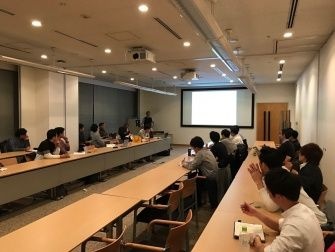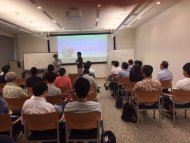On Sunday, November 25, 2018, a meeting of the Healthcare Network, established by Professor Yuji Nagasawa, was held at the Tokyo campus. The network has more than 300 members in Tokyo, Nagoya, and Osaka, mainly students and graduates working in the pharmaceutical and medical industries, and meetings are held regularly. This year's meeting was held at the Tokyo Campus, where about 40 current and former students gathered. On the day of the meeting, three agenda items were presented, and the participants were divided into groups for discussions and presentations on each topic.
In addition to discussions and presentations, the Pharmaceutical and Medical Network Subcommittee of the Institute for Strategic Management (the Healthcare Network) is a place where current and former students can actively interact and learn from each other, not only during their studies but also after graduation.
This time, the participants were divided into groups to discuss and present the following topics.
* Possibilities and challenges of the sharing economy in research and development
* Challenges of drug discovery venture
* The concept of a healthcare hospital business in Vietnam: What's the next step?
The presenter, a graduate of the program at Tokyo Campus, gave a presentation on the theme of "Possibilities and Challenges of the Sharing Economy in Research and Development." The presenter, a graduate of the School from more than 10 years ago, said that he was nervous because it reminded him of his old school days, but his presentation, which was logically put together, seemed to have given many participants suggestions.
In recent years, companies that develop platform businesses such as UBER and Airbnb have achieved significant growth. Can the characteristics of such platform businesses (e.g., no need to purchase or manage assets) be applied to the pharmaceutical and medical industries? If so, with whom and what should be transacted between each stakeholder on the platform? For example, the presenter asked the question, "Is it possible to separate the resources necessary for management (people, equipment, funds, information, etc.) from the organization and supplement these resources by bringing in entities (players) outside the organization?" This was the question posed.
A variety of stakeholders are expected to participate in the platform. For example, researchers, information gatherers, pharmacies, medical institutions, regulatory authorities, health care providers, funders, equipment owners, patients and citizens, clinical trial participants, and many others. In this context, for example, it would be good to have a platform that connects researchers who want to conduct experiments but do not have experimental facilities with companies, organizations, and individuals who own experimental facilities. and other examples of companies that are already working on similar initiatives were used to stimulate the participants' ideas.
It was impressive to see the participants pondering new business models for the pharmaceutical and medical industries through the diverse questions posed by the presenters.

 Brochure
Brochure
 Info Session
Info Session
 Application
Application
 Alumni Voices
Alumni Voices












